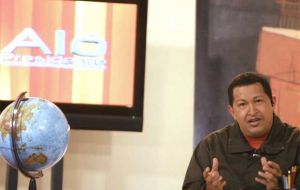MercoPress. South Atlantic News Agency
Venezuela stronger than Germany or Spain, says Chavez
 Chavez: “Venezuela has two years imports reserves”
Chavez: “Venezuela has two years imports reserves” President Hugo Chavez boasted that Venezuela has more foreign reserves to face the current global crisis that Spain or Germany, following a cabinet meeting which was broadcasted live.
"We, in merit to our efforts and the good management of resources have accumulated 42 billion US dollars in reserves, and if we include all other funds we can say that Venezuela currently has sufficient reserves to guarantee two years of imports", stated the Venezuelan leader. He added that certain countries such as Spain "have reserves equivalent to 15 days imports and others such as Germany don't have that level of reserves". Three months ago Chavez also boasted that the Venezuelan Central Bank has 80 billion US dollars in international reserves. But in spite of the vehemence and confidence of the Bolivarian revolution undisputed leader, Venezuelan economists have another mathematical picture of the situation. In effect if the expenditure level of past years is maintained in 2009 "it will be a very difficult year for Venezuela". Since July last year the Venezuelan oil average price has dropped from 126 US dollars to 35 US dollars last Friday. This could have a devastating impact for a country whose overseas earnings have a 93% dependency on oil exports and over 50% of fiscal revenue also comes from hydrocarbons. Further more the Finance ministry estimated the 2009 national budget based on a 60 US dollars a barrel of oil, and soaring imports in 2008 reached 55 billion US dollars. "We're not in recession and will not be in recession" said Chavez. "Even if the oil price drops to zero, Venezuela will not suffer a crisis". However it must be taken into account that President Chavez is currently campaigning for the mid February referendum which will open the way for his unlimited re-election. But Venezuelan macroeconomics doesn't seem to have influenced his political support. In the last five years Chavez recovered from a short lived coup, survived a twelve month oil industry strike and a dramatic economic slowdown: he defeated a recall referendum and was ratified as president. In 2007 at the zenith of his popularity with the economy having expanded sixteen quarters running, he first tried to convince the Venezuelan electorate to grant him the unlimited re-election, but was rejected. This new reform attempt also comes under extraordinary circumstances. In spite of the 2008 oil boom average Venezuelan incomes were down 3.4%, inflation soared to 30.9% (41.3% for the food basket) and cost of living figures among the short list of issues most pressing for public opinion together with insecurity and lack of jobs. Although official unemployment in Venezuela stands at 6.1%, the small numbers from the Statistics Office shows that 42.9% of Venezuelans work in the informal economy with no fixed incomes or access to social security.




Top Comments
Disclaimer & comment rulesCommenting for this story is now closed.
If you have a Facebook account, become a fan and comment on our Facebook Page!